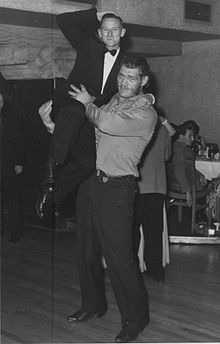Ski Hi Lee
| Ski Hi Lee | |
|---|---|
 | |
| Birth name | Robert E. Leedy |
| Born | February 9, 1921 Toronto, Ontario, Canada |
| Died | 1973/1974 United Kingdom |
| Professional wrestling career | |
| Ring name(s) | Ski-Hi Lee Sky Hi Lee Sky-Hi Lee Sky High Lee |
| Billed height | 6 ft 8 in (2.03 m) |
| Billed weight | 300 lb (140 kg) |
| Billed from | Texas |
Robert E. Leedy (February 9, 1921 – 1973 or 1974) was a Canadian professional wrestler, better known as Ski Hi Lee. He was active for some twenty years. His name is sometimes written as Ski-Hi Lee, Sky Hi Lee, Sky-Hi Lee or Sky High Lee. The pronunciation is 'Sky High' rather than 'Skee High'. Lee was usually billed from Texas and wrestled as a cowboy. He had a 54-inch chest, 87-inch arm reach and was said to be 6 feet, 8 inches tall.
Professional wrestling career
Leedy began wrestling in the mid-1940s, always working as a bad guy, or Heel, because his towering presence made him easy to fear. He has been described as a "country bumpkin version of Jaws from James Bond".[1] The name Ski Hi Lee is a play on the name of wrestler Sky Low Low, a midget wrestler from Quebec. Lee was almost always promoted as a "special attraction" in the territories he worked.
Lee was not a very technical wrestler, resorting more to brawling and cheating than to finesse. In 1951 he defeated Al Mills for the NWA Canadian Heavyweight Championship, a feat he would repeat in 1952. Some of Lee's most memorable matches were against other big men such as Killer Kowalski, whom he wrestled in many promotions all over the United States and Canada. In the 1960s Lee went to the UK because of income tax issues, where he wrestled part-time, the physical strain on his body having become too much to allow him to maintain a full career in the sport. He eventually retired due to ill health.[citation needed]
Filmography
- 1967 Nasihat (Bollywood film)
Personal life
In the early 1950s, Leedy lived on Delta Street, in Etobicoke, Ontario. While still working as a wrestler, Leedy also owned and operated a Dude Ranch (Rocking H in Acton, Ontario) and a restaurant just outside his native Toronto. After retiring from the ring, Leedy had a role in theatre in Paris, apparently as a caveman. He was married to a country singer named Billie Allen Skuce and sometimes appeared on stage with her as a comic foil. They had three children: Robert, Richard and Sandra (who later changed her name to Sandy). Robert Jr. joined the Marines and Richard the Army.
Robert Sr. divorced Billie, who later married John M. Carroll, who adopted all three Leedy children. (Carroll had three boys from his own previous marriage).
The divorce was reputed to be ugly. Lee was described as "a heavy-drinking rabble-rouser", who demonstrated his toughness by allowing his back to be used on stage as a dartboard and chewing light-bulbs in the dressing rooms. He would also on occasion order a shot at the bar and then proceed to eat the glass in front of the patrons. Others have described him as gentle and harmless.
Leedy is well remembered amongst older South Africans, because he is mentioned in a locally-famous satirical song from the sixties entitled "Ag Pleez Deddy" ("Oh Please Daddy", also known as "The Ballad of the Southern Suburbs", by Jeremy Taylor, 1961), in which reference is made to a scheduled bout between Lee and a well-known South African wrestler, Willie Liebenberg. Whether this bout really took place and, if so, who won, is moot.[2] Lee certainly appeared in the ring in South Africa on many occasions and he also fought in Australia.[3]
The exact date and cause of Lee's death is not known. It has been suggested that he suffered from a form of gigantism known as acromegaly and that this shortened his life. In the late 1960s and early 1970s, when he worked in a pub in Pimlico, students at the nearby Westminster Hospital were regularly told to go to the pub when he was working to observe him, as he provided a textbook case of acromegaly in terms of height and characteristic facial appearance.[citation needed]
Championships and accomplishments
- NWA Canadian Heavyweight Championship (Calgary version) (2 times)[4]
- Stampede Wrestling Hall of Fame[5]
References
- Specific
- ^ McCoy, Heath (2005). "Pirates on the Prairies". Pain and Passion: The History of Stampede Wrestling. CanWest Books. pp. 63–64. ISBN 978-0-9736719-8-8. Retrieved 2009-04-10.
- ^ David Kingsbury (2006-02-24). "Sky-Hi Lee". Retrieved 2009-04-10.
- ^ MediaMan.com.au. "Australian Professional Wrestling: A Short History". Retrieved 2009-04-10.
- ^ "N.W.A. Canadian Heavyweight Title [Calgary]". www.wrestling-titles.com. Retrieved 2009-04-10.
- ^ Paul Banik. "Official Stampede Wrestling Hall Of Fame (1948-1990)". wrestling-titles.com. Retrieved 2009-04-10.
- General
- Oliver, Greg (2003). "Sky Hi Lee". the Pro Wrestling Hall of Fame - The Canadians. ECW Press. p. 161. ISBN 1-55022-531-6.
- "Online World of Wrestling Profile: Sky Hi Lee". Online World of Wrestling. Retrieved 2009-04-10.
